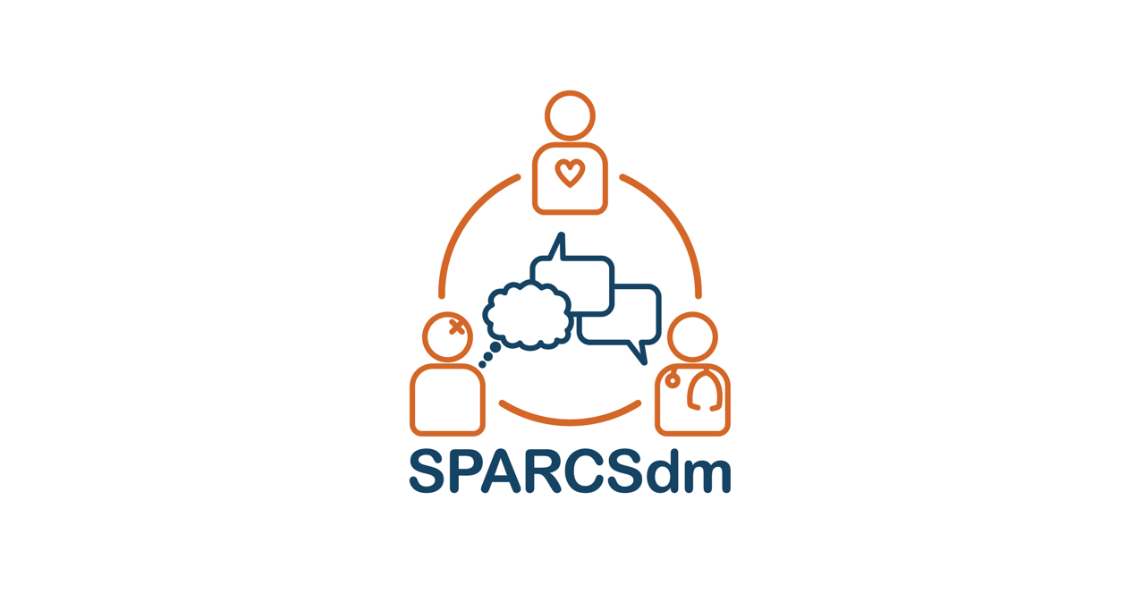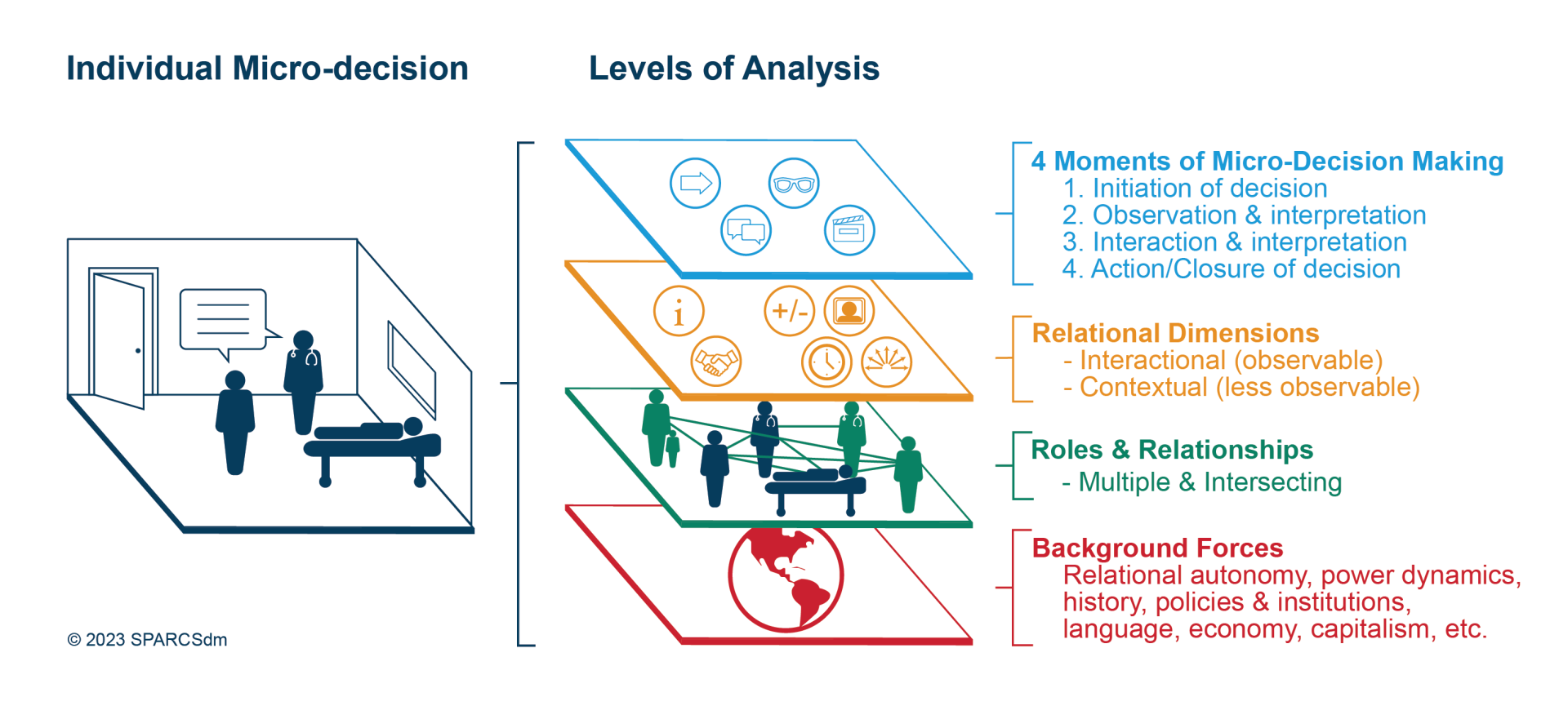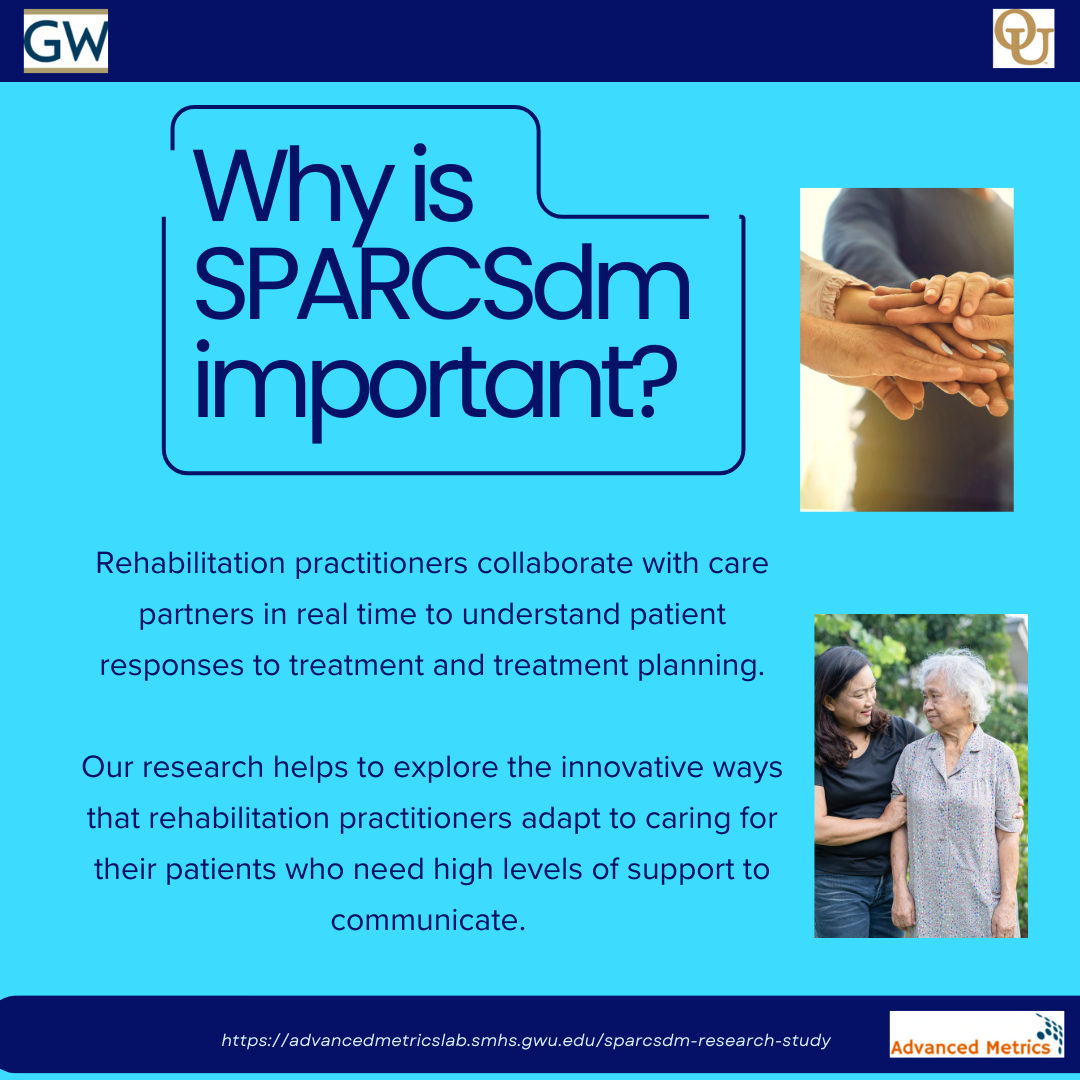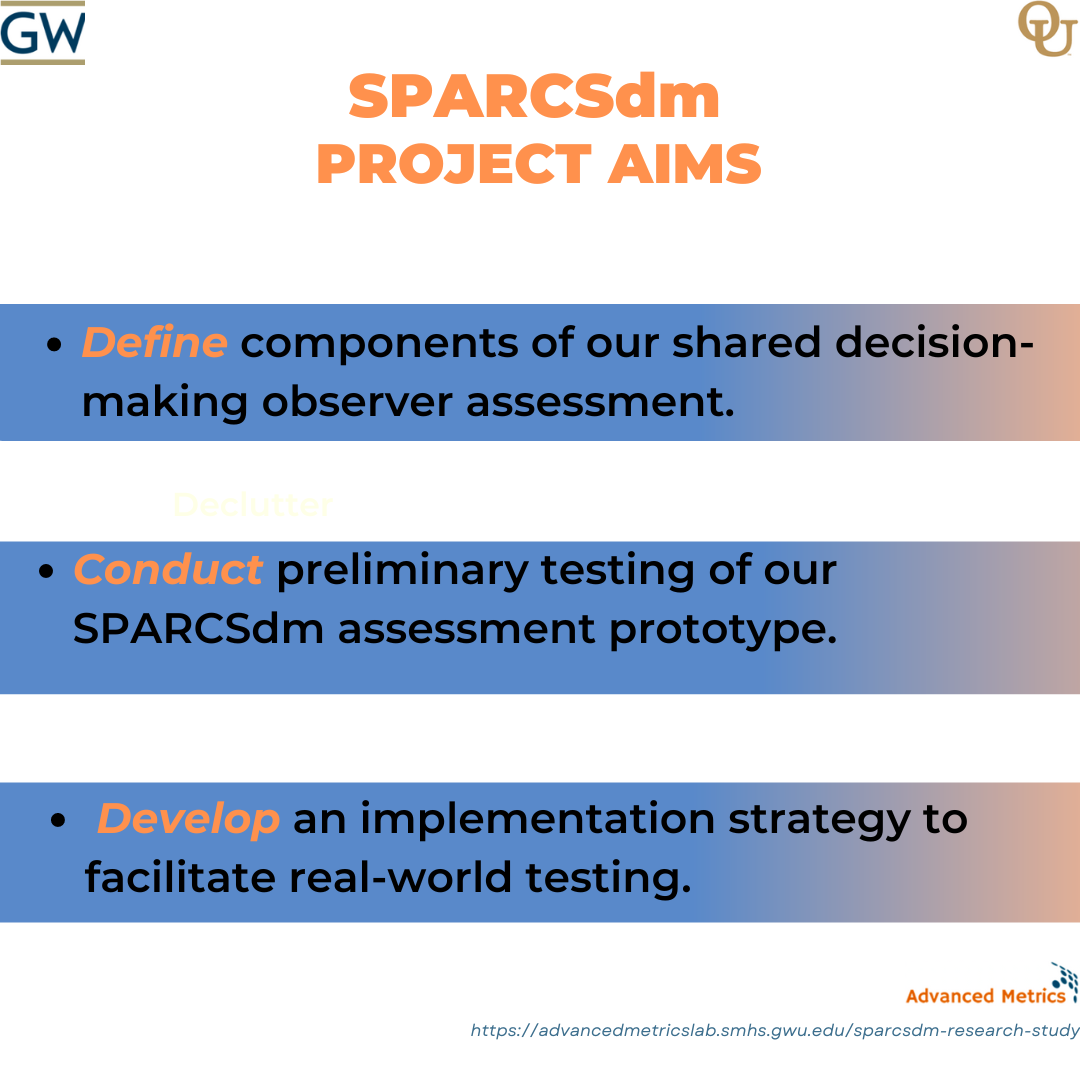
What is the SPARCSdm?
This research study seeks to understand how healthcare professionals and care partners make decisions together for persons with high support needs due to cognitive and communication disabilities. This will be done by developing an assessment, Standardized Process Assessment of Relationship-Centered Shared decision-making (SPARCSdm). This assessment will be used within various clinical encounters, care settings, and populations.
Why are we creating the SPARCSdm?
Shared decision-making (SDM) is a collaborative process in which patients and healthcare professionals work together to make healthcare decisions informed by science and the patient's values and preferences. The SDM process is unique for patients who cannot advocate for themselves because it involves choices that are recurrent, may not have clear supportive evidence, and are made by care partners who speak for their loved ones and themselves. Currently, available SDM assessments are not designed to capture these complexities.
Our focus is on persons who lack the ability to decide for themselves and communicate their wishes to others. Care partners (i.e. family and informal caregivers) play a critical role in the shared decision-making process since they are representatives in all healthcare encounters including decision-making. They are essential voices in communicating and advocating with healthcare professionals about treatment decisions. But care partners and practitioners struggle to engage in SDM, and our purpose in developing the SPARCSdm is to address these issues. We will recruit from three patient populations: persons in disorders of consciousness, persons with dementia, and children with developmental disabilities.
SPARCSdm Study Updates
- Get Involved
-
Undergraduate Student Research Position—Volunteer
Do you wish to learn more about how research in health sciences happens? Join our multi-disciplinary team of researchers, clinicians, and caregivers from across the US to learn about shared decision-making in medical rehabilitation for persons who need high levels of support, such as those experiencing disorders of consciousness and dementia.
We have a variety of important research tasks that you can support our team with:
• Data collection: we have opportunities to interact with healthcare professionals and caregivers in a healthcare setting to build rapport and recruit for our study. Also, you can assist with collecting video and audio data at research sites.
• Data analysis: you can help us by reviewing previously conducted interviews, between our team and rehabilitation therapists, where you listen and check that the automated transcript is accurate.
• To ensure our team is aware of all research within shared decision-making, you can support us with conducting literature reviews.
• We value sharing our study goals and updates with others, so you can also help our team create dissemination products, such as posters, visuals, reports, social media posts, and publications. - Aims of this Study
-
- Define the components of a shared decision-making observer assessment based on our conceptual process model
- Conduct preliminary testing of our SPARCSdm (observer) assessment prototype
- Develop an implementation strategy to facilitate real-world testing.
- Our Newsletters
-
The inaugural issue of the SPARCSdm Newsletter introduces the SPARCSdm research project. Learn about the project’s goals, team members, and early accomplishments, and discover how the Relationship-Centered Shared Decision-Making Model centers relationships and care partners in complex healthcare decisions
Explore how everyday micro-decisions shape care for patients with disabilities in clinical settings. This issue further discusses the Relationship-Centered Shared Decision-Making Model (RCSDM), highlights field observations of therapy sessions, and spotlights the research and insights of Dr. Luke Lindemann.
This issue spotlights the vital role Speech-Language Pathologists (SLPs) play in supporting patients with complex communication needs. Learn how SLPs collaborate with care partners to make micro-decisions in rehabilitation settings and explore how their expertise contributes to patient-centered, relationship-driven care.
Centered on the experiences of informal care partners, this issue highlights their essential contributions to both caregiving and research. Featuring team members Paige Ford and Trisha Kot, the newsletter explores how care partner insights shape decision-making models and enhance rehabilitation outcomes for individuals in disordered states of consciousness.
In this issue, Dr. Marla Clayman shares insights on person-centered shared decision-making (SDM) in complex care environments, emphasizing the importance of aligning treatment with patients’ real lives. The issue also highlights team contributions at the 2024 ACRM Conference, and updates to the SPARCSdm process model.
The final issue of the SPARCSdm Newsletter reflects on the conclusion of the SPARCSdm project (for now) and celebrates the people who made the work possible. This issue honors the contributions of research assistants and early career investigators through personal reflections on studying micro-decisions, collaboration, and relationship-centered care in rehabilitation settings. It also highlights team achievements, dissemination efforts, and the lasting impact of the SPARCSdm model as the work continues into its next chapter.
- Funding
-
This research project is funded by the Agency for Healthcare Research and Quality (AHRQ) R01 grant. AHRQ is the lead Federal agency charged with improving the safety and quality of healthcare for all Americans.
- Our Team
-
Trudy Mallinson, PhD, OTR/L
Trudy is an occupational therapist and researcher. She established the Advanced Metrics Lab (AML) in 2016 to support her primary research idea that better outcomes measurement can improve health care and inform health care policy.
trudy [at] gwu [dot] edu (trudy[at]gwu[dot]edu)Christina Papadimitriou, PhD
Christina is a sociologist who studies disability using phenomenology (lived experience and meaning-making) and equity-based approaches. She is passionate about fostering relationship-centered healthcare.
cpapadimitriou [at] oakland [dot] edu (cpapadimitriou[at]oakland[dot]edu)Meredith Norwood, OTD, MOT, OTR/L
Meredith earned her Master’s of Occupational Therapy from Saint Louis University and has been a practicing pediatric occupational therapist since 2017. During her clinical practice, she developed a special interest for helping children and their families who suffer from chronic pain. She earned her post-professional Doctorate of Occupational Therapy from The George Washington University in 2021 and joined the Primary Care Research Program (P-CART) at The George Washington University in 2022. Meredith serves as the project manager for the SPARCSdm Research Study.
meredith [dot] norwood [at] email [dot] gwu [dot] edu (meredith[dot]norwood[at]email[dot]gwu[dot]edu)Luke Lindemann, PhD
Luke Lindemann received his PhD in Linguistics from Yale University in 2019. His research interest is in characterizing patterns of speech variation in order to understand the causes of miscommunication in healthcare encounters. He is currently a member of the Advanced Metrics Laboratory, in which he studies communication and decision-making in complex healthcare encounters. These include interactions that involve individuals in disordered states of consciousness and interactions with individuals that require the services of a language interpreter.
lukelindemann [at] gwmail [dot] gwu [dot] edu (lukelindemann[at]gwmail[dot]gwu[dot]edu)
Emily Hall
Emily completed her undergraduate studies in kinesiology and health promotion at the University of Kentucky in 2021. She earned her Master's in Public Health- Health Promotion from George Washington University in May 2023. Previously, she has been involved in research surrounding substance use, health databases, and sexual violence. She currently works as a research assistant on the SPARCSdm project.
ehall8 [at] gwmail [dot] gwu [dot] edu (ehall8[at]gwmail[dot]gwu[dot]edu)Ann Guernon, PhD
Dr. Ann Guernon is an Assistant Professor in the graduate speech-language pathology program at Lewis University and a Research Health Scientist at the Hines VA. She conducts mixed methods research focused on cognitive-communication treatment development and implementation for persons following acquired brain injury. Her work also strives to develop an understanding of how communication and interactions between a variety of end-users influences person-centered care and shared decision-making throughout the continuum of injury prevention and rehabilitation with a specific focus on sport-related concussion in youth and individuals in disordered states of consciousness.
aguernon [at] lewisu [dot] edu (aguernon[at]lewisu[dot]edu)Sophia Slack
Sophia Slack is a fourth-year undergraduate student and will complete her studies in Nutrition Science and Public Health at George Washington University in May 2024. She has worked on the No One Listens to Me project throughout her time as an undergraduate student which has strengthened her interest in shared-decision making. She currently works as a student research specialist for the SPARCSdm project.
sophia_s [at] gwmail [dot] gwu [dot] edu (sophia_s[at]gwmail[dot]gwu[dot]edu)Allison Katz
Allison Katz is a senior undergraduate student at Oakland University studying Clinical and Diagnostic Sciences with a specialization in Pre-Clinical Professions.
astdennis [at] oakland [dot] edu (astdennis[at]oakland[dot]edu)Keith Cox, PhD
Keith Cox is a Postdoctoral Scholar in the School of Medicine and Health Sciences at George Washington University and a Visiting Scholar in the School of Health Sciences at Oakland University. As a medical sociologist with an interest in communication, he uses conversation analysis to study video-recorded medical visits in a variety of clinical contexts including primary care, oncology, pediatric neurology, and inpatient rehabilitation. He is particularly interested in how practitioners and families manage interactional challenges that arise in complex medical contexts.
keith [dot] cox [at] email [dot] gwu [dot] edu (keith[dot]cox[at]email[dot]gwu[dot]edu)Prabhdeep Bathla
pbathla [at] oakland [dot] edu (pbathla[at]oakland[dot]edu)Marla Clayman, PhD
marla [dot] clayman [at] va [dot] gov (marla[dot]clayman[at]va[dot]gov)Linda Cotton, PhD
cottonl [at] gwu [dot] edu (cottonl[at]gwu[dot]edu)Paige Ford
paigeford2011 [at] yahoo [dot] com (paigeford2011[at]yahoo[dot]com)Roger Ideishi, PhD
rideishi [at] gwu [dot] edu (rideishi[at]gwu[dot]edu)Trisha Kott
beekae [at] aol [dot] com (beekae[at]aol[dot]com)Laurie Lyons
lbl [at] gwu [dot] edu (lbl[at]gwu[dot]edu)Jay Meehan
meehan [at] oakland [dot] edu (meehan[at]oakland[dot]edu)Christina Prather
cprather [at] mfa [dot] gwu [dot] edu (cprather[at]mfa[dot]gwu[dot]edu)Jen Weaver, PhD
jen [dot] weaver [at] colostate [dot] edu (jen[dot]weaver[at]colostate[dot]edu)Philippus Jan Van der Wees, PhD
vanderwees [at] gwu [dot] edu (vanderwees[at]gwu[dot]edu)Tricia Grady-Dominguez
patricia [dot] grady [at] colostate [dot] edu (patricia[dot]grady[at]colostate[dot]edu)Diya Manghnani
diya [dot] manghnani [at] gwmail [dot] gwu [dot] edu (diya[dot]manghnani[at]gwmail[dot]gwu[dot]edu)Aishi Sarkar
aishi [dot] sarkar [at] gwmail [dot] gwu [dot] edu (aishi[dot]sarkar[at]gwmail[dot]gwu[dot]edu) - Advisory Board
-
Teal Benevides
tbenevides [at] augusta [dot] edu (tbenevides[at]augusta[dot]edu)Shawneequa Callier
scallier [at] gwu [dot] edu (scallier[at]gwu[dot]edu)Tori Goldhammer
lahconsultations [at] yahoo [dot] com (lahconsultations[at]yahoo[dot]com)Syrita King
syrita [dot] king [at] yahoo [dot] com (syrita[dot]king[at]yahoo[dot]com)Susan Magasi
smagas [at] uic [dot] edu (smagas[at]uic[dot]edu)Yetta Myrick
ymyrick [at] dcautismparents [dot] org (ymyrick[at]dcautismparents[dot]org)Ellen Schultz
ellen [dot] schultz [at] emschultzconsulting [dot] com (ellen[dot]schultz[at]emschultzconsulting[dot]com)Karolyn Teufe
kteufel [at] mfa [dot] gwu [dot] edu (kteufel[at]mfa[dot]gwu[dot]edu)
- Find Out More About Our Model
-
The RCSDM is designed to help us study how decisions are made in clinical encounters among patients with chronic disabilities who receive high levels of support for advocacy, their surrogate decision makers (often their care partners), and healthcare professionals. Our model is needed because current shared decision-making models (SDM) models fall short in addressing micro-decisions that persons with disabilities, their care partners, and healthcare professionals engage in.

- Publications
-
Read our newly published article: A New Process Model for Relationship-Centered Shared Decision-Making in Physical Medicine and Rehabilitation Settings

